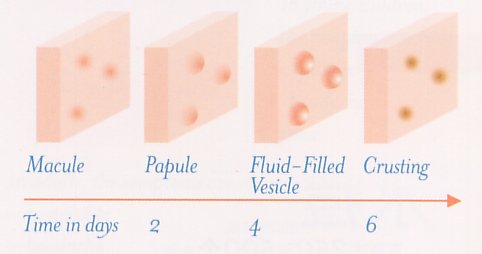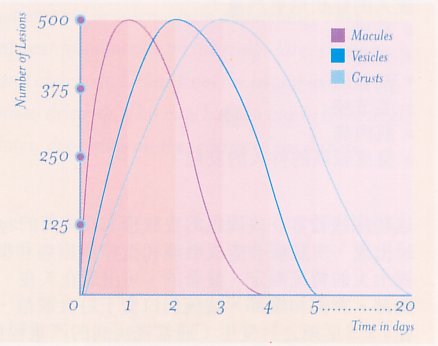Myths & Facts
Myths:
- Restriction of food that are dark e.g. dark soy sauce, because it will leave dark scars.
- Restriction of certain types of food, like chicken, prawns and crabs for four months because it is “poisonous and gets very itchy.”
- Cannot bathe and wash hair, otherwise wind will enter the body and cause rheumatism in old age.
Facts:
- The important thing is not to scratch or break the lesions as this will invite infection that cause scarring and pigmentation.
- There is no medical basic that eating chicken, seafood and eggs interfere with the healing process.
- It is alright to bathe and wash hair. However, do not rub down but rather dab dry with a towel after the bath so not to break the lesions an invite infection.
The incubation period varies from two to three weeks. The virus can easily transmit from the infected person incubating even a few days before rashes appear. Infected persons continue to be contagious until all crops of vesicles have crusted over.
A Highly Contagious Disease
Humans are the only known carriers of this virus.
Chickenpox cases occur throughout the year. But epidemics usually happen when carriers of the virus come into close contact with many non-immune individuals (e.g. family, schools, nursing homes, offices). That’s why when someone in the family get chickenpox, he has a very high chance of infecting his family members.
Herpes Zoster
Herpes zoster, also known as shingles, is caused by the Varicella Zoster virus, the same virus that cause chickenpox.
After a chickenpox infection, the virus retreats to near the ‘root’ of spinal cord – nerve ganglia. It then lies dormant and inactive in nerve ganglia (latent phase). Herpes zoster develops when the virus reactivates in later life, causing shingles (Herpes Zoster).
High Risk Group and Complications
Everyone is at risk – as long as you are non-immune to the virus. Chickenpox affects both sexes and is reported in all races.
- Normal Healthy adults – Death rate of 2.7/100,000 in 15 – 19 years old age group and 25.1/100,000 in 30 – 49 years old age group.
- Patients with
- severe asthma
- leukemia
- lymphoma
- HIV and persons receiving high -dose steroid. They stand a higher risk of:
- Serious varicella infection and disseminated disease (up to 36%)
- Multiple organ system involvement
- May become fulminant and hemorrhagic
- Complications are pneumonia and encephalitis
- Newborns of mothers who are infected within 5 days before to 2 days after delivery.
Stages of the Chickenpox Rash
The rash itself can be extremely itchy. It is important not to scratch it, as this can lead to bacterial infections and worse scarring.

Duration of Rash Healing
“Secondary” cases of chickenpox ie. patients who catch chickenpox from immediate family members, tend to be more severe and take longer to heal.

The Symptoms
In young children, the symptoms include:
- fatigue
- headache
- fever
In adults, the symptoms are more severe:
- irritability
- headache
- loss of appetite
- pain in the joints
- muscle pain
- a higher and prolonged fever
These symptoms usually occur 24 to 36 hours before the onset of rose-colored skin rashes. Depending on the individual, there rashes cause either mild or intense pain and itching. They appear prominently on the scalp, face, chest, back and abdomen. Crusts from the lesions will fall off when dried up. This may happen one to three weeks later, depending on the severity of the disease.
The total number of lesions comes up to between 250 & 500. Adults usually have more and deeper lesions, and have a greater risk of complications – about 10 to 25 times higher.
Treatment
An effective and fast acting-way of treating chickenpox is the use of Anti-Viral
Anti-viral tablets may be prescribed by your doctor to:
- Reduce the duration and severity of the chickenpox infection
- Accelerate healing
- Potentially reduce long-term scarring
- Lessen the discomfort and suffering of patients
To obtain the full benefits, treatment must be started as early as possible. Your doctor will determine if anti-viral therapy is appropriate for you or your child.
Anti-viral treatment is useful in preventing complications in patients who are at risk. These patients include those with the following:
- Patients on long-term steroid therapy
- Patients with Systemic Lupus Erythematosus (SLE)
- Patients with active extensive atopic eczema
- Patients who have undergone organ transplant
Over-the-counter products can be used to help relieve the symptoms of fever and itching but they do not shorten the disease. Aspirin is not recommended for children with chickenpox.
Prevention
An effective and long term way of preventing chickenpox is through vaccination. You can protect yourself again chickenpox by getting a course of chickenpox vaccination.
Keep an infected person isolated from the moment the lesions appear till they are crusted. Unfortunately, the chickenpox virus is already infectious one to two days before the rashes appear. It is therefore very difficult to prevent the disease from spreading.
Possible Complications
Scarring is also an unwanted long term consequence of chickenpox.
- Skin bacterial infection
- Pneumonia
- Shingle (from reactivated latent chickenpox virus)
- Abortion and still-birth
Chickenpox is especially dangerous to pregnant women as it is also associated with the risk of chickenpox in the unborn fetus and newborn infants.
When primary infection is delayed until adult life, the illness can be severe resulting in pneumonia, haemorrhagic varicella, encephalitis or visceral dissemination. Pneumonia is the most common cause of death in adult cases.
Q & A for Chickenpox Vaccination
What are the possible side-effect?
The vaccine is both safe and well-tolerated with few side-effects such as redness at injection site, rash and low-graded fever. Such reactions are usually very mild and transient.
How effective is the vaccine?
The vaccine has proven to be 99% effective in protecting children. However, breakthrough infections following exposure to wild type virus (epidemic) occur on some vaccinated people, resulting in illness that is usually very mild (one to three lesions on average, with no fever).
Who should be vaccinated against chickenpox?
As long as one has no history of chickenpox, anyone 12 month of age and above can be vaccinated.
Are booster vaccination needed?
A single vaccination is sufficient in children below 12 years old. However, a booster vaccination may be advisable in particular cases, a two-dose schedule should be used in anyone above 12 years old.
Can the vaccine be given when ill?
It is best to consult the doctor first. Like all others vaccinations, it is usually not recommended when there is fever.
What is the duration of protection of the vaccine?
Only time will tell whether immunized children and adults are protected for life. One follow-up study in Japan has shown that after 20 years, those who were immunized in the 70’s still remain protected, with only 2% breakthrough chickenpox.
How long does it take to develop protection after vaccination?
After vaccination, it takes the immune system about two weeks to build up protection.
Q & A for Chickenpox Treatment
How soon must treatment be initiated?
The anti-viral treatment must be initiated as soon as possible under the supervision of a doctor.
What are the benefits of treatment?
- Reduces the duration and severity of the infection.
- Reduces the incidence of complication arising from chickenpox infections.
- Accelerate healing.
- Potentially reduce long term scarring.
- Lessen the discomfort and suffering of the patients.